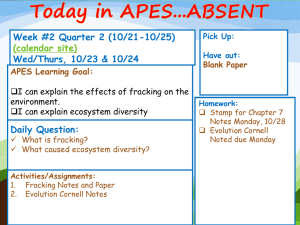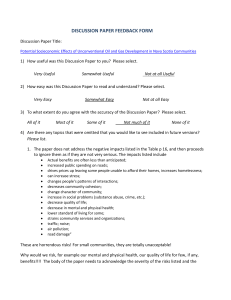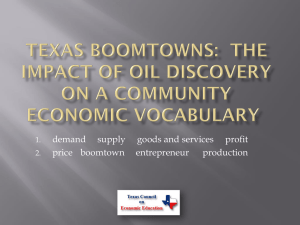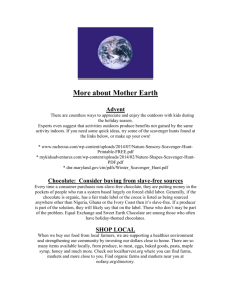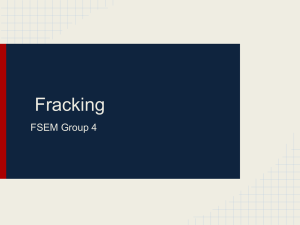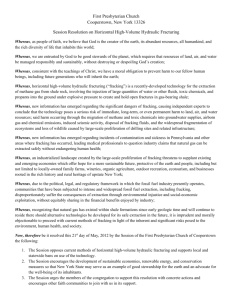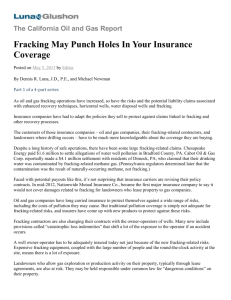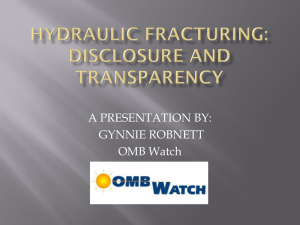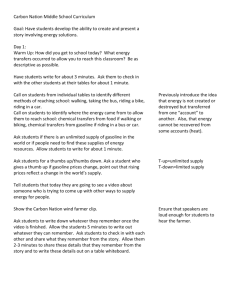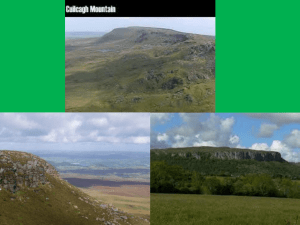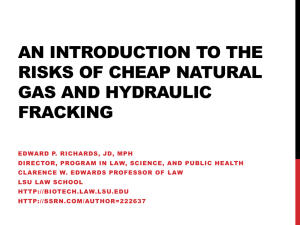My Own Green Field in the Petroleum Production Video Study
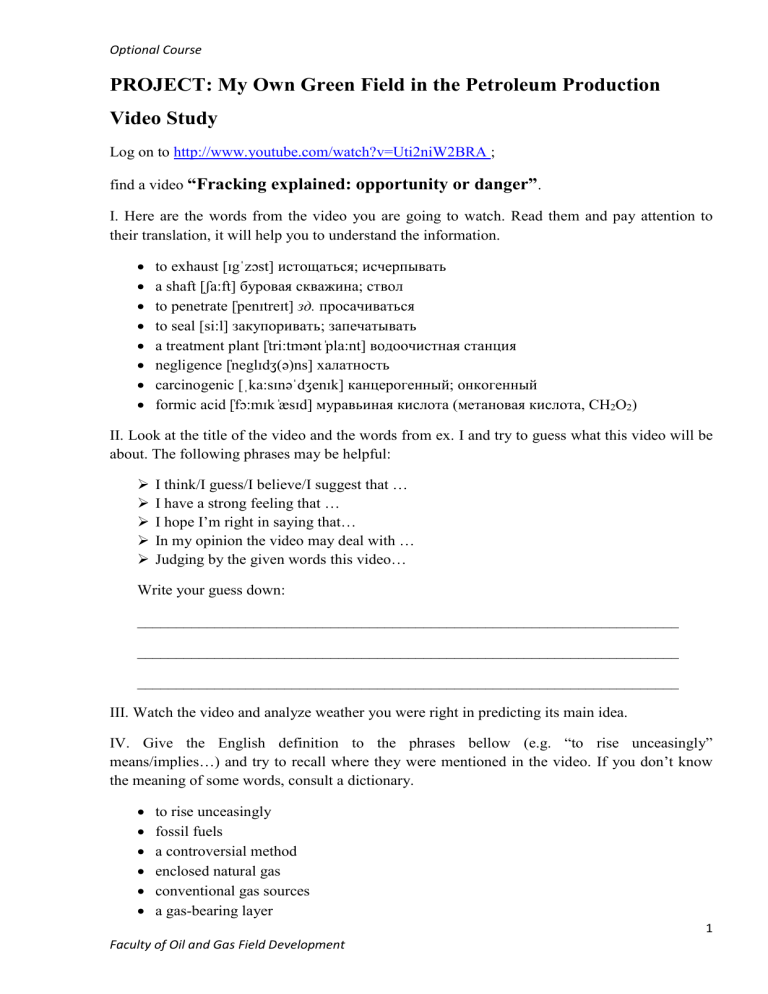
Optional Course
PROJECT: My Own Green Field in the Petroleum Production
Video Study
Log on to http://www.youtube.com/watch?v=Uti2niW2BRA ; find a video
“Fracking explained: opportunity or danger”
.
I. Here are the words from the video you are going to watch. Read them and pay attention to their translation, it will help you to understand the information.
to exhaust [ɪgˈzɔst] истощаться; исчерпывать
a shaft [ʃa:ft] буровая скважина; ствол
to penetrate [̍penɪtreɪt] зд.
просачиваться
to seal [si:l] закупоривать; запечатывать
a treatment plant [̍tri:tmənt ̍pla:nt] водоочистная станция
negligence [̍neglɪdʒ(ə)ns] халатность
carcinogenic [ˌka:sɪnəˈdʒenɪk] канцерогенный; онкогенный
formic acid
[̍fɔ:mɪk ̍æsɪd] муравьиная кислота (метановая кислота, CH
2
O
2
)
II. Look at the title of the video and the words from ex. I and try to guess what this video will be about. The following phrases may be helpful:
I think/I guess/I believe/I suggest that …
I have a strong feeling that …
I hope I’m right in saying that…
In my opinion the video may deal with …
Judging by the given words this video…
Write your guess down:
______________________________________________________________________
______________________________________________________________________
______________________________________________________________________
III. Watch the video and analyze weather you were right in predicting its main idea.
IV. Give the English definition to the phrases bellow (e.g. “to rise unceasingly” means/implies…) and try to recall where they were mentioned in the video. If you don’t know the meaning of some words, consult a dictionary.
to rise unceasingly
fossil fuels
a controversial method
enclosed natural gas
conventional gas sources
a gas-bearing layer
1
Faculty of Oil and Gas Field Development
Optional Course
high-performance pumps
innumerable tiny cracks
severe contamination
long-term studies
Here are the phrases you may use doing this assignment:
My guess is…
We come across the word/the phrase … in the episode dealing with …
We come across the word … when the narrator tells about …
Feel free to make use of any other appropriate phrases you know.
V. Answer the following questions.
1.
What is a controversial method of extracting natural gas?
2.
Are over 60% of all new oil and gas wells drilled by using fracking?
3.
Is a horizontal hole or vertical one drilled into the gas-bearing layer of rock?
4.
Does fracking contaminate drinking water?
5.
Does the natural gas extraction release greenhouse gases?
VI. Watch the video again and write out all verbs used with the word “fracking/hydraulic fracturing”. Make sure that you know their meaning.
_______________________________________________________________________
_______________________________________________________________________
_______________________________________________________________________
VII. Watch the video once again and be ready to fulfill some tasks.
VIII. Agree or disagree with the following statements. While doing the task note that some of the statements may be true or false in full or in part. Choose an appropriate beginning for your response.
I think/believe/guess it’s true.
Give your reasoning why referring to the video: as the film goes/has it/as the narrator puts it…
I’m afraid it’s not true/I’ll have to argue/I don’t think it is right/Just the opposite.
It’s right to a certain extent/in a way.
I quite agree with the first part of the statement that … but as to the assertion that … it’s unfounded/erroneous/mistaken.
Sorry to say, but …
There’s no mention of this fact in the video.
It makes no sense, so sorry to say.
2
Faculty of Oil and Gas Field Development
Optional Course
An emotionally charged reaction may start with such phrases as:
That’s an overstatement! …
Oh, that’s an exaggeration!
It’s odd to say the least of it; how’s that; how come; a nice mess; it’s news to me, etc.
1.
Hydraulic fracturing was designed by a Swedish engineer Carl Daniel Ekman.
2.
The majority of the energy consumption is supplied by fossil fuels like coal and natural gas.
3.
Fracking describes the recovery of gas from deep waters.
4.
First of all, in fracking, a shaft is drilled not deep into the Earth. And from there a vertical hole is made into a gas-bearing layer of rock.
5.
On average, the fracking fluid consists of 8 million liters of water, several thousand tons of clay and only 2,000 liters of chemicals.
6.
The chemicals multiply the quantity of water, produce certain bacteria and dissolve minerals.
7.
When the gas source is exhausted, the drill hole is sealed.
8.
Fracking consumes large quantities of fresh water which is absolutely non-hazardous for people.
9.
All companies using fracking are ready to say the precise composition of the chemical mixture.
10.
The negative effects of hydraulic fracturing on the climate balance are great.
IX. Divide into two groups. a) One group should write down all the advantages which were mentioned in the video.
The other group is responsible for all the disadvantages. b) Then add your list with your own ideas about the fracking. Work in groups, discuss your opinions. You have 10 minutes. c) After gathering all pros and cons be ready to sum up them and persuade your opponents that your position is right. Be convincing, confident and do not forget to rely on facts rather than on guesses.
The following phrases will help you.
For reasons given above
To put it briefly/generally speaking
By the way/besides/moreover
Most probably
In other words/all in all
As compared with
Additionally/I might as well add that/what’s more, on top of that
As I see it/the way I see it
My opponent may be right, but all the same
I see what you mean, but
Naturally/certainly/sure/exactly/definitely/quite/most likely/absolutely
Beyond all doubts
3
Faculty of Oil and Gas Field Development
Optional Course
I won’t deny
X. Analyze the information you’ve received from the video and try to formulate its main purpose. Think why this video was created.
Write down your ideas:
____________________________________________________________________________
____________________________________________________________________________
____________________________________________________________________________
XI. Following the example of this video you may try your hand at creating your own movie about any problem connected with petroleum engineering. Or you can just make a video about your profession and everything that is somehow connected with it.
In creating your video you should follow the plan:
1.
Think of the theme of your video.
2.
Define the format (a monolog or a dialogue) and a time limit.
Think of other people who can take part in your video. (E.g. A young man in the foreword, the Dean of the faculty talking about the discussed problem or your profession).
3.
Make up your own scenario.
If it’s a narrative make sure it’s logically arranged: a) a foreword to give a foretaste of what is to come; b) introduction of yourself and the problem you’re going to discuss; c) the presentation of all the information you’ve got about the problem, you can use all improvised materials that will help you to give the gist of the matter; d) you can talk about the colleagues or groupmates you work/study with if you believe it helps you; e) do not forget to come to the conclusion.
4.
Check the scenario with your teacher.
5.
Practice it thoroughly.
6.
Create your own video. Don’t hesitate to use visual aids which may contribute to its success.
Good luck and have fun!
Don’t forget to share your masterpiece with your pals.
4
Faculty of Oil and Gas Field Development
